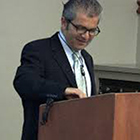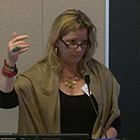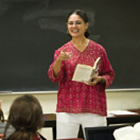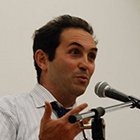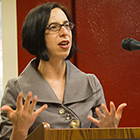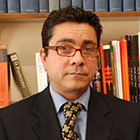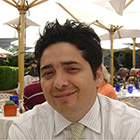Courses and Syllabi
This course examines the role women in the transatlantic literary cultures of Britain and the Americas in the eighteenth and nineteenth centuries. Taking as its starting point the rise of the rights of women debate, we will focus on the complex ways in which women generated and expanded transatlantic conversations about such monumental issues as slavery and the slave trade, revolution, empire, cosmopolitanism, science, and theology, all of which emerged as integral features of transatlantic political cultures. In addition to British and US American authors, we will consider the writings of writers living in Mexico, Central and South America, and the Caribbean (e.g., Flora Tristan, Maria Graham, and Frances Calderon de la Barca). In doing so, we will develop a better understanding of the international relationships and intercultural contacts between women in Britain and all of the Americas that helped establish a transatlantic literary culture that was able to cross national borders, languages, and ethnic groups.
During the nineteenth-century, the novel became one of the world's most influential cultural forms due to its mass popularity and tendency for social commentary. Within a national and properly British or US American context, the novel soon emerged as the privileged genre for exploring the increasingly complex structures of British and American societies, including social forms such as inheritance, marriage, and crime, middle-class subjectivity, and imagined communities. Yet, the study of the novel as a global literary phenomenon operating and circulating across the Atlantic offers new possibilities for thinking about the novel's role in producing and/or critiquing the structures of an emerging Atlantic world order. Taking as our starting point Margaret Cohen's argument that novels travel due to their ability to be appropriated by diverse societies, this course will consider the complex ways in which the novel was able to engage with the cultural, political, and ideological issues being reworked and reinscribed by the transatlantic movement of people, ideas, and cultural artifacts between the 16th and 19th centuries. In addition to canonical British and American novels, such as Daniel Defoe's Robin Crusoe, Charles Brockden Brown's Wieland, and Jane Austen's Mansfield Park, we will consider novels of the Spanish Atlantic, including Cervantes's Los Trabajos de Persiles y Sigismunda and José Joaquín Fernández de Lizardi's El Periquillo Sarniento, widely considered the first Latin American novel.
This course serves as an introduction to modern postcolonial literature and theory. Reading novels, short stories, and essays from postcolonial Africa, India, the Caribbean, and Britain, we examine the relationship between nationalism, migration, and literary form, tracking the shift from realism to postmodernism and magic realism. How do contemporary writers decolonize the mind? In a rapidly globalizing world, what place do national identities have, if any? How do we define 'traditional' and 'modern' in a time of fluid identities? How are these ideas of tradition gendered and why? We will also look at how postcolonial texts circulate in the West, as exotic commodities, or as sites of resistance, and explore how they challenge reductive discourses of the clash of civilizations and new forms of colonialism and racism.
We will examine European representations of Amerindians and African slaves in dialogue with contemporary Caribbean and Black British literature that rewrites or retells their stories. Some of the works include Shakespeare's The Tempest, Césaire's A Tempest, Behn's Oroonoko, Equiano's Narrative, Phillips's Cambridge, Rhys's Wide Sargasso Sea, and Cliff's Abeng.
Globalization and Postcolonial Literatures: Writing the Environment
Studies in Postcolonial Literature
Prof. Sanchez
How does the study of world literatures help us to understand the globalization process? Globalization is often associated with recent social and economic shifts, but many scholars argue that its structures derive from the history of colonialism. Turning to the natural world seems to provide a model to dismantle colonial and national boundaries and to speak in terms of shared planetary concerns such as global warming. Or does it? To examine these relations between globalization, empire, and ecology, we will turn to postcolonial writers in English from Africa, the Caribbean, South Asia, and the Pacific Islands and examine how they inscribe threats to the world environment. We will draw from diverse genres such as short stories, poetry, film, and the novel. Topics to be considered include indigenous and diasporic relationships to the land, plantation agriculture, gardening, nuclear militarization, oil drilling, and human and environmental sustainability.
Transatlantic studies, particularly as an emerging discipline in the humanities, has been central in generating new conceptual frameworks for thinking through the complex issues related to the interconnectedness of Atlantic rim cultures. Focusing on the ways in which cultures, ideologies, and political identities are reworked and reinscribed by the transatlantic movement of peoples, ideas, and cultural artifacts, this course will seek to expand our notions of romanticism (typically understood within exclusively British and US American contexts) to include transoceanic perspectives that understand early-nineteenth-century romantic literature as a transatlantic phenomenon. Topics for discussion will include literature and the transatlantic slave trade, travel and exploration, transatlantic revolution and independence movements, global feminisms, cosmopolitanisms, and other "contact zone" experiences created by travel, migration, and colonial enterprises across the Atlantic.
During the nineteenth century, Britain emerged as the world's most expansive planetary empire with a sphere of influence affecting the lives of hundreds of millions of people and discrete communities. Although political historians are now seeking to understand the role of this vast empire in the development of a new global order beginning to take root in the nineteenth century, one of the main challenges for literary critics remains to determine the complex, and often vexed relations of global politics to the production of art, society, and culture at large. In this course we will seek to develop a greater understanding of nineteenth-century literature as a global phenomenon. This means not only attending to the relationship of literary works to Britain's colonial enterprise-paying attention, for example, to the particular ways in which poetry, novels, drama, and other imaginative works helped shape, reinforce, and critique British imperial ideology-but also its role in more broadly shaping nineteenth-century global formations, including international law and thought, ideas about political boundaries and state sovereignty, economic liberalism, and the place of war and violence in maintaining peace throughout the globe. As a result, some of the topics to be discussed will include the relationship between nineteenth-century literature and the following: transatlantic and worldwide commercial systems, the slave trade, travel and exploration, foreign wars and political revolutions, and the collision of regional environments, especially with respect to religious and cultural conflicts. We will also attend to recent work on global feminisms, cosmopolitanisms, and "contact zone" experiences created by travel, migration, and Britain's colonial enterprise. While key critical works will help us establish these geo-political frameworks, we will also read literature about Other places-including Ireland, India, the Middle-East, Africa, North America, Latin America, and Spain.
In an age in which cultures and societies find themselves inescapably integrated into complex global networks of communication and trade, literary critics have been increasingly invested in thinking about the influence of global forces on aesthetic production. Resituating the study of literature of the United States within a wider Hemispheric context, American studies in particular has actively sought out new critical paradigms that not only challenge notions of North American exceptionalism, but also integrate U.S. literature with writings from other parts of America, including Canada, Mexico, Central America, and South America. This course will critically evaluate the benefits and liabilities of this new critical paradigm, often referred to as Hemispheric American Studies, and provide a broad survey of both literary and theoretical texts from and about America from 1776 to the present. While key critical works will help us establish the important debates of Hemispheric American Studies, primary texts will provide useful case studies for thinking through these issues.
This course provides a survey of the literatures of the Americas from a transatlantic perspective, emphasizing the complex ways in which the letters of North America, Central America, South America, and the Caribbean forge a distinctly American perspective on global affairs. Charting the literary history from the "age of discovery" (Columbus) to the nineteenth-century US American revolution and Latin American independence movements, and beyond, this class will consider the relationship between American literature and the following topics: empire, colonialism, and the "New World"; slavery and the transatlantic slave trade; cross-cultural encounters between European and indigenous peoples; race, class, and gender in the Americas; and the legacy of American independence in transatlantic affairs. Works to be considered include such texts as Columbus's Four Voyages, Whitman's Leaves of Grass, and José Joaquín Fernández de Lizardi's El Periquillo Sarniento.
In recent years, we have come to understand race as a global construct, characterized by the increased circulation of ideas, bodies, and objects. This course reads a range of literature from Africa, the Caribbean, Black Britain, and the United States outside of the confines of national borders, as part of what Paul Gilroy has termed the Black Atlantic. Focusing on the ways in which black writers like Jamaica Kincaid, Toni Morrison, Caryl Phillips, Ama Ata Aidoo, Chris Abani, Paule Marshall, and Zakes Mda represent the experiences of slavery, migration, and colonialism, the course examines the relationship between politics and aesthetics, history and memory, and tradition and modernity. Readings include not only texts that highlight transnational mobility, but also those that take up the conceptual core of the idea of diaspora: the loss of home, the meaning of memory, and the struggle to find a usable past.
Postcolonialism is not a unified field of theoretical inquiry. This seminar, therefore, does not offer a linear narrative of the topic, but takes instead an episodic approach that focuses on the works of some of the most prominent theoreticians for the field, including Franz Fanon, Edward Said, and Gayatri Spivak. It provides a framework for thinking about the theoretical and political implications of using "postcolonialism" as an umbrella term to designate the ensemble of writings by those subjects whose identities and histories have been shaped by the colonial encounter. This class will be co-taught by Ali Behdad, Jenny Sharpe and Liz DeLoughrey and will cover topics such as the politics of representation; postcolonial feminisms; nationalism and national allegory; literary form (modernism, realism, postmodernism); and explore intersections between postcolonial and globalization studies.
The field of postocolonial studies has been driven by narrative theory, which is where this course will begin. We will examine the value of narratology through a classic study, Peter Brooks's Reading for the Plot, and William Faulkner's Absolom! Absalom! as a case history for charting postcolonial plots. We will proceed to theories of landscape, image, time, and affect as critical frames that work through a range of representational registers besides narrative. In particular, we will examine the relationship of these theories to a modernity that emerged out of empire and its ruins. We will also consider how poetry can allow us to rethink the narrative drive and desires of the field. The following are some of the questions the course will address: What is the desire guiding the reading of a literary work? Are methods and theories derived from odernist and postmodernist texts only applicable to the literature of these periods? What are the advantages and limitations of one analytical frame over another? Rather than folowing a linear trajectory (i.e. reading for the story), this course will alllow students to move across the various critical approaches and literary works.
Syllabi List
About List
Below you will find a list of courses and syllabi offered by our faculty in the English department. This is intended for personal use only. Please do not share or distribute without explicit permission.


